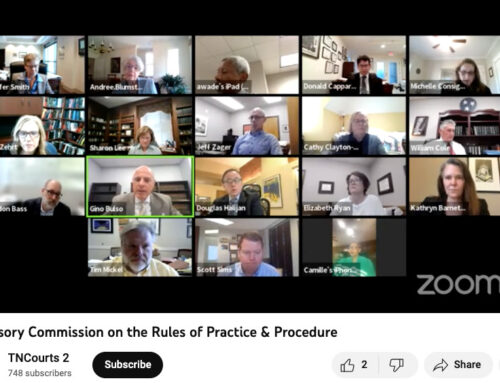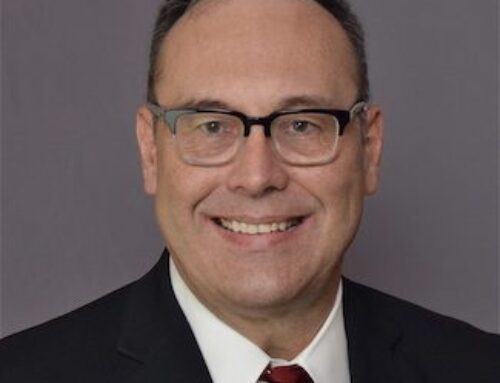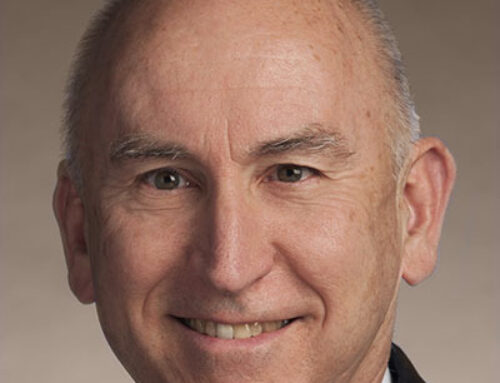The County Industrial Development Board of Greeneville and Greene County is arguing in a lawsuit that the Open Meetings Act does not require that citizens be able to hear deliberations of a governing body at public meetings, only that they be given the opportunity to be present.
The arguments are found in filings to try to dismiss a complaint made by 47 people, many who live or own property along the Nolichucky River, who say that the Industrial Development Board violated the law when it held a July 18 meeting, but “purposefully or negligently prevented (citizens in attendance) from hearing deliberations…”
The citizens note that board members “conducted deliberations while sitting around a table, a number of them with their backs turned to the public.”
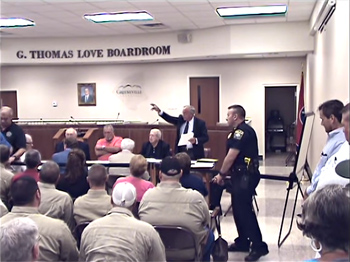
County Mayor Alan Broyles orders that Eddie Overholt be removed from the public meeting, after Overholt asked the board to speak louder so people could hear.
The room was equipped with microphones, but they were not used. When one member of the public, Eddie Overholt, asked the board to speak up so citizens could hear, he was ejected from the meeting (video here), and arrested and charged with disrupting a public meeting and resisting arrest. Charges were later dropped.
Now, the 47 citizens are asking for an injunction to stop construction of a water pipeline system that would draw an estimated 1.5 million gallons of free water from the Nolichucky River daily, discharging back 500,000 gallons of effluent.
The Industrial Development Board in its deliberations on July 18 approved a plan that would allow construction of the water pipeline for US Nitrogen’s use, including a re-application to the Tennessee Department of Transportation for right-of-way. The IDB would own the pipeline.
US Nitrogen needs the water in its manufacturing process to make ammonium nitrate, used in industrial explosives.
Lawyers for the Industrial Development Board and US Nitrogen, which also was named in the complaint, say the Open Meetings claim should be dismissed because “deliberations took place in the public’s presence, and a vote was held before the public’s watchful eyes.”
As to whether citizens have a right to hear what members of the governing board say? “…Plaintiffs are attaching a requirement to the Open Meetings Act that does not exist in the statute or in case law.”
They also say that the IDB “took reasonable steps to accommodate those in the room” and blamed the citizens for their inability to hear. “Opponents of the pipeline plan were vocal and likely contributed to any difficulties in hearing the proceedings.”
Right before Overholt was ejected from the meeting, there had been applause in the audience, and County Mayor Alan Broyles who chairs the board warned about any more outbursts.
After the meeting, 59 complaints were filed with the Office of Open Records Counsel, a part of state government that among other duties tracks potential open meetings violations.
One of the complaints, from April Bryant who is now a plaintiff, said the industrial development board’s attorney was the only official to stand and speak loudly enough to be heard. “Several people in attendance moved forward trying to hear what was being said in extremely low voices by the vast majority of the officials, even after they were told that no one could hear them at the beginning of the meeting,” Bryant wrote in her complaint. “I was in attendance and wanted very much to hear the discussions and decisions being made and I have no idea what was said other than Mayor Broyles ordering citizens silenced.”
After reviewing the complaints, and videotape from the meeting, Open Records Counsel Elisha Hodge wrote to Broyles that it was her opinion that meetings should be audible to the public:
The Tennessee General Assembly has declared “it to be the policy of this state that the formation of public policy and decisions is public business and shall not be conducted in secret.” T.C.A. 8-44-101. Additionally, Tenn. Code Ann. Section 8-44-102(a) reads, “[a]ll meetings of a governing body are declared to be public meetings open to the public at all times except as provided by the Constitution of Tennessee.”
While the only specific language in the open meetings act that addresses the public’s ability to hear a meeting is found in the provisions that address meetings that are held electronically, it is the opinion of this office, based upon the declaration from the General Assembly referenced above, that all public meetings of a governing body are required to be held in a manner that permits the public to hear the issues being deliberated and/or the decisions being made.
Hodge, who has since left her position to take another job, said in a footnote in the letter that she watched a link to a video recording of the meeting several times. “There are portions of the meeting that are inaudible to me even though there was a microphone on the camera that was being used to record the meeting.”
Still, the industrial development board and US Nitrogen argue that “Even taking as true the Plaintiffs’ allegation that some citizens could not hear deliberations, this is not enough to void the actions taken at the meeting, given the steps taken by the IDB and the openness of the meeting.”
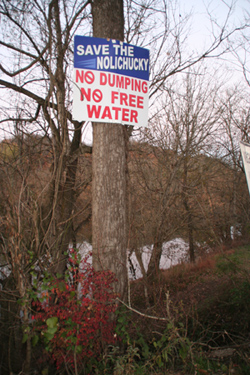
A sign by the Save the Nolichucky organization fighting the plan to draw and discharge water into the river where it runs between Greene and Cocke counties.
An Open Meetings violation based on a right to hear deliberations is one of several complaints made by the citizens in their lawsuit. They also allege in their filing that US Nitrogen, which received economic development subsidies and help from local government, originally represented to the public that it would buy water from local utilities and providers, but instead was “secretly planning to ultimately obtain water for free from the Nolichucky River.”
They also say that US Nitrogen entered into an undisclosed transaction “with one or more of the IDB members and a member of a local utility to gain access to certain real property…in order to facilitate the installation of a pump station and intake and discharge pipes into the Nolichucky River” before it publicly announced it would abandon it plans to buy water from local utilities.
“Upon information and belief, US Nitrogen, with the aid of at least one member of the IDB, devised a ‘bait and switch’ procedure pursuant to which US Nitrogen gained certain approvals, permits and/or licenses from various local and state agencies without disclosing the true nature of its plans and intentions, in order to deny the Plaintiffs, and other similarly situated persons, the opportunity to respond or oppose the secret plans of US Nitrogen.”
The defendants say in their filings that US Nitrogen will have “unquestionable positive economic impact” in Greene County. The plant is estimated to employ 80 people and the company has already invested more than $100 million into the project.
Scott Hurley of the Hurley Law Firm in Knoxville is representing the citizens.
Jerry W. Laughlin of Laughlin, Nunnally, Hood & Crum in Greeneville represents the Industrial Development Board of Greeneville and Greene County. Michael K. Staff, W. Travis Parham, Lauren Sturm and Joseph Watson of Waller Lansden Dortch & Davis are representing US Nitrogen LLC.
A hearing before Chancellor Douglas Jenkins is scheduled for 9 a.m. Monday, Dec. 8, to consider the defendants’ motion to dismiss and the plaintiffs’ motion for an injunction. (An earlier version of this blog post reported a previous date of Tuesday, Dec. 2).


